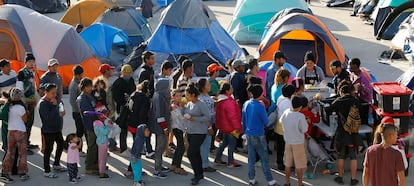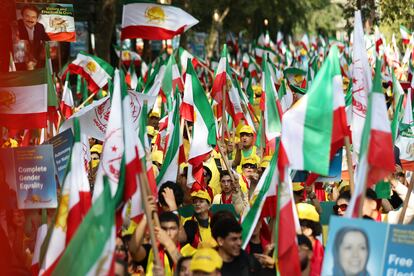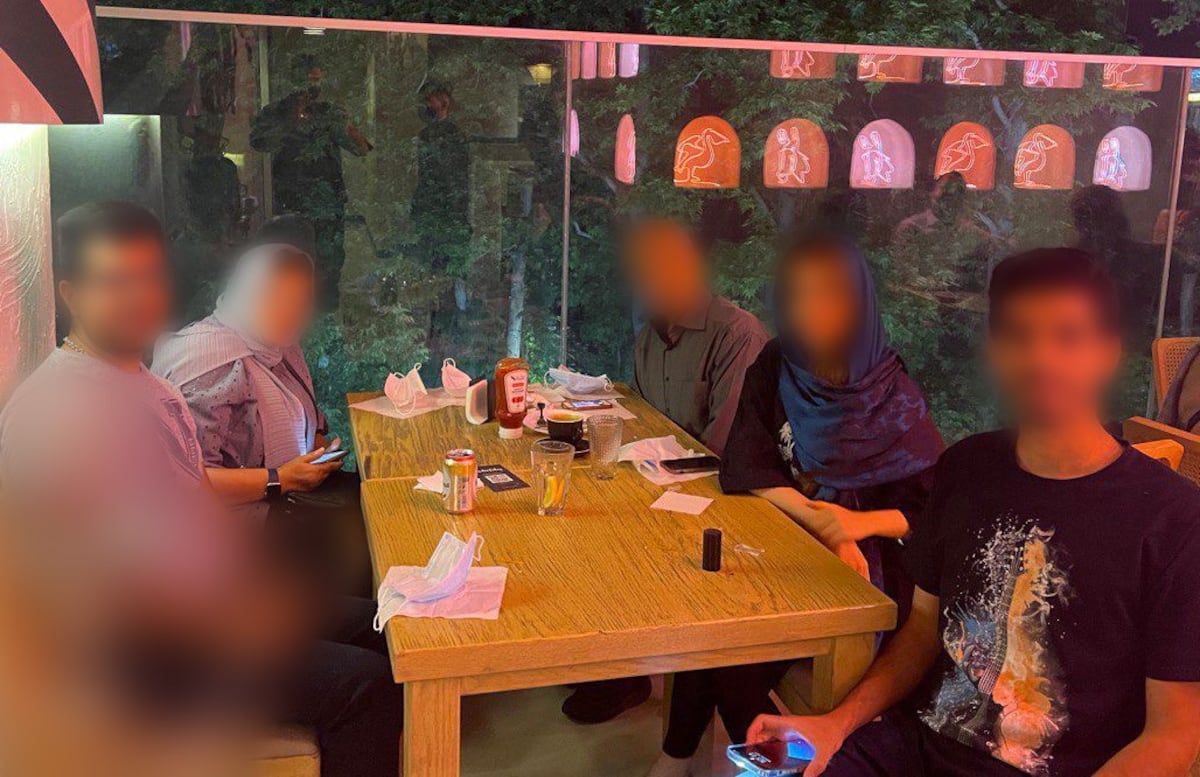Rostam has been waiting 11 years to see his parents, brother, and sister again. He is in California, safe thanks to his refugee status for religious persecution, but with the feeling of being incomplete. His family, in Iran, lead restricted lives, navigating a world in which they are not welcome as practitioners of the ancient Zoroastrian religion within a fundamentalist Islamic republic.
“The situation is very hard, very hard,” says Rostam, who prefers not to use his last name for fear of reprisals against his family in Iran or against himself in the United States. “I don’t sleep well. We’re always thinking about when this will end. All of this has affected our progress in life because we’re constantly worried,” he laments over a video call.
With Donald Trump back in power and the launch of the most aggressive and restrictive immigration policy in modern history, the hope of embracing his family again in the near future is less a dream than a delusion that collapses as soon as reality hits. On October 1, the U.S. government is set to publish the maximum number of refugees the country will admit during the next fiscal year, which runs from October to September. It is expected that the number will be small. The last year of Trump’s first term saw the lowest number in history, at 11,000. And although Joe Biden closed his presidency with the highest number ever — 125,000 — that figure has not even come close to being reached: on his first day back in the White House, Trump indefinitely froze refugee admissions.
Within the U.S. immigration system, refugee resettlement is a relatively small component, but its dismantling is one of the clearest indicators of the nature of the current administration’s policies. While the motivation for accepting refugees is to protect vulnerable populations from other parts of the world, the actions of the Trump administration show that they view refuge as part of general migration. Even worse, they treat it as a mechanism to “bypass” immigration rules. In the case of asylum, although it is a separate legal process handled by a different agency, the same pattern has occurred, as demonstrated by the relentless campaign to eliminate temporary protections that protect hundreds of thousands of Venezuelans, Cubans, Nicaraguans, Haitians, and others.
 Asylum seekers line up at the El Barretal shelter in Tijuana, Mexico.Daniel Dreifuss (ACNUR)
Asylum seekers line up at the El Barretal shelter in Tijuana, Mexico.Daniel Dreifuss (ACNUR)
After being closer than ever to reuniting at the end of last year, bitterness and pessimism have now become Rostam’s most constant companions. When it all began, however, it wasn’t this way. It was 2015, he was 23, and he was about to have to fulfill Iran’s mandatory military service. As a Zoroastrian, the experience in the Iranian army — which swears allegiance to the Ayatollah, the supreme leader of the Islamist state — loomed as a nightmare. So, shortly before it began, Rostam submitted his refugee application as a member of a persecuted religious minority ahead of his family and arrived in California, where some distant relatives were already living. The rest of his immediate family would follow a few months later, once his father had settled some outstanding matters.
But in 2016, the United States elected Donald Trump president for the first time, and his arrival was accompanied by a travel ban for a handful of majority-Muslim countries, including Iran. The window for securing refuge closed as well — and would not reopen for about eight years.
With Biden’s election, the new Democratic administration set to work updating and streamlining the U.S. refugee system, which had been nearly paralyzed by delays and inefficiencies. Over the four years of the administration, new verification protocols — partly driven by pandemic-related restrictions — were introduced, including virtual interviews, which greatly accelerated application processing. What once could take years could now be resolved in months. In this way, Rostam’s family reunification process restarted at the end of last year.
They were given the green light, and the family felt like they were going to reach the United States. “They paid a total of about $12,000 last November in fees and mandatory insurance. They sold their furniture, they sold their car, they sold everything,” Rostam says.
But once again, Trump’s election shattered the family’s dreams when he ordered the complete halt of all refugee and asylum applications.
Since then, over nine months, Rostam has been met with silence that each day further weakens the reserves of hope that fuel his imagination when he pictures his parents emerging from a U.S. airport to be with him again. Now, with a voice worn down by discouragement, he fears it may be too late for them to have a future together as a family.
“My father is 70. Ten years ago, he was 60, younger, and had more energy. My mother is 65 now. They can’t walk the same way at their age,” says Rostam, who makes a living from home in Orange County through online commerce.
 Demonstration against the Iranian government on September 23 in New York.Heather Khalifa (AP)
Demonstration against the Iranian government on September 23 in New York.Heather Khalifa (AP)
Rostam and his family’s refugee process is part of the Lautenberg program, a provision that facilitates certain people qualifying as refugees in the United States — originally religious minorities from the former Soviet Union, such as Jews, Evangelicals, or Ukrainian Catholics, as well as certain Iranian groups. The program lowers the burden of proof required to demonstrate persecution, requiring only membership in a designated group rather than evidence of individual persecution. Now, like the rest of the U.S. refugee system, the program is paused.
In his struggle to get his family out of Iran, where they face difficulty working and general discrimination because of their religion, Rostam is assisted by the International Rescue Committee. Founded in 1938 by Albert Einstein, the organization now operates in 40 countries helping refugees rebuild their lives. But under the Trump administration, even an organization with such experience and resources can only do so much.
“There’s no new information. I call and they tell me three months, four months, but there’s no update, no news,” Rostam says, exasperated. “I think this country should know that refugees are not bad people. We help the United States. They check [our backgrounds], we pay the fees. It’s not the same as someone crossing the border illegally. We’ve been waiting for years,” he pleads.
It is clear that the Trump administration does not make that distinction.
Sign up for our weekly newsletter to get more English-language news coverage from EL PAÍS USA Edition
